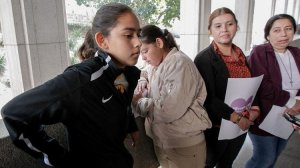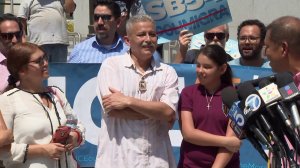Local father Romulo Avelica-Gonzalez, 48, was released Wednesday from the custody of U.S. Immigration and Customs Enforcement, six months after the agency arrested him while he was dropping his 13-year-old daughter off at school in Lincoln Heights. A second daughter filmed the devastating ordeal from the backseat, helping launch her father’s case to national prominence.

Avelica disputed the legitimacy of the charges he was arrested on, and an immigration appeals court threw out his final deportation order earlier this month. That doesn’t mean he is safe, though — the case will return to the lower court that originally ordered his deportation.
Below, Avelica penned an op-ed for CNN about his time at ICE’s Adelanto detention facility and fight for humane immigration policy.
Trapped inside an immigration detention center in Adelanto over the past six months, I often felt powerless. I did not give up, but only because of my family’s strength, my faith, and the support of my growing community of supporters.
The sense of powerlessness when inside prison walls is overwhelming. But now that I am on the outside, my experience gives me strength. That’s why, as I thank all of those who stood up to help me, I am also asking them to help others who are still ensnared in this cruel system.
I was arrested by immigration officers in late February while dropping my daughters off at school — and that set off events I could never have imagined. My 14-year-old, Fatima, recorded the officers taking me — through her tears from the backseat of the car. Despite her devastation, Fatima went to school that day. She told her teachers and cousins what had happened. Everyone started making calls to help: to civil rights organizations, city and county officials, religious leaders — anyone, and everyone.

Immigration and Customs Enforcement tried to deport me that same night, but the community outcry prevented that.
As the weeks passed, I had to learn how to kill the time so that the time would not kill me. I savored minutes in the recreation yard, as well as the few possessions that reminded me of home — a photo of my children, a handmade rosary, a necklace of Saint Jude.
I kept a list of all of the days I missed: the birthdays of my children and grandson, the graduations of my daughter and niece, my 28th wedding anniversary.
While I was locked up, my daughters and niece ran the Los Angeles Marathon. It was so hard not to be able to see them cross the finish line. But from inside those walls, I saw something that made me even more proud. I watched my daughters find their voices to fight for my freedom — and the rights of all immigrants. They transformed our family crisis into a call to action.
I was moved by the willingness of so many people to speak on my behalf — from Gov. Jerry Brown, to Los Angeles Mayor Eric Garcetti, to city and county representatives, and the United States Congress.
I do not know why so many were captivated by my experience. Perhaps everyone can relate to the horror of being ripped away from your children while carrying out such a routine, daily task like dropping them off at school. But over the past six months, I have learned that my family’s horror is not unique.

A father in a neighboring cell was so devastated by the denial of his asylum case that he tried to take his own life. Another father saw the home he had worked for years to build for his family crumble when police transferred him to immigration following a drug arrest.
A Haitian cellmate did not have money to make a phone call, and no way to contact his family; he later found out from inside the detention center that his wife had died. Other cellmates went on a hunger strike to protest poor medical care and exorbitant bonds that kept them detained only because of their inability to pay.
If my strength falters on the road ahead, I will use my daughters as my guide. Last week, Fatima met Gov. Brown. She thanked him for his support on my case. And she summoned the courage to ask him to do something more. My daughter asked the governor to sign the strongest version of a bill — SB 54, or the California Values Act — that will make sure California police and sheriffs aren’t helping to deport our families.
To me, “California values” mean keeping families together, working toward a better future for our children, and not subjecting people to double punishment for lack of a piece of paper.
I was born in Mexico. My roots are there. But roots can be transplanted. I have lived more than half my life here. A piece of paper cannot prevent me from claiming the country where I raised my children, where I have worked for decades, where I have built a life I am proud of. I am an immigrant to this country, but it is my country, too.





